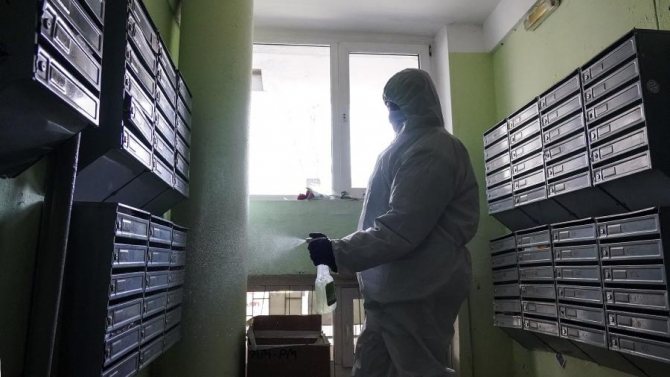The MA must comply with the licensing requirements imposed on it
The GZHN body conducts inspections of management organizations to ensure that they comply with mandatory licensing requirements in their work. Their list is presented in Art. Art. 161, 162, 193 Housing Code of the Russian Federation, including:
- The management authority is responsible for the provision of all services and performance of work for the proper maintenance of the common property of an apartment building (Part 2.3 of Article 161 of the Housing Code of the Russian Federation).
- The MA is responsible for providing utility services of appropriate quality or for ensuring the readiness of engineering systems for their delivery (Part 2.3 of Article 161 of the Housing Code of the Russian Federation).
- During the agreed period, for a fee, the management company must perform the duties provided for in the management agreement (Part 2 of Article 162 of the Housing Code of the Russian Federation).
- The company is obliged to comply with other requirements established by the Government of the Russian Federation (Part 7 of Article 193 of the Housing Code of the Russian Federation).
Violation of licensing requirements for a management company may result in administrative liability under Art. 7.23.3, 14.1.3 and 19.5 of the Code of Administrative Offenses of the Russian Federation. On March 29, 2021, Federal Law No. 26-FZ of March 18, 2019 came into effect, establishing administrative liability for managing apartment buildings in gross violation of licensing requirements.
The list of gross violations of licensing requirements is determined by Decree of the Government of the Russian Federation dated September 13, 2018 No. 1090. One of them is that the licensee has a debt recognized by him or confirmed by the court to the RSO in an amount equal to or exceeding two average monthly obligations.
The State Housing Authority may hold the company administratively liable for such a violation. Whether he has the right to oblige the management authority to pay the existing debt by issuing an order after an inspection, we will tell you using the example of case No. A43-7419/2019, which reached the Armed Forces of the Russian Federation in April 2021.
10+ reasons for the administrative authority to challenge the protocol on an offense
64780
Transfer of debts to collectors. Reality or just a scare?
The threat of collection of debts for housing and communal services by collectors until recently was an effective measure of influence on negligent residents. Of course, it was largely intended to put pressure on the debtor and force him to pay.
A collection agency is just an intermediary between the debtor and the management company, and such cases actually did exist: housing and communal services debts considered unpromising could be sold by management companies. But this rarely happened; the threat most often remained nothing more than psychological pressure on the owner or tenant in order to force him to pay the debt.
However, the moment came when cynicism and semi-criminal methods of influencing debtors resulted in a ban at the state level for collection agencies to collect debts for housing and communal services.
IMPORTANT.
The management company does not have the right to sell housing and communal services debts to collection agencies. This norm was enshrined in Federal Law No. 214-FZ of July 26, 2021.
The law has been in effect for more than a year and a half. And today, management companies, as well as all other organizations that are in charge of supplying services and collecting funds for them - homeowners' associations, housing or other consumer cooperatives - do not have the right to sell or transfer overdue utility bills to someone else.
The same applies to resource supplying organizations and regional solid waste disposal operators, to whom utility fees are paid.
The ban on the transfer of debts for housing and communal services applies to all legal entities, including companies that carry out work to return overdue debts of individuals - collection agencies. Violation of this norm may backfire for the management company: concluded agreements on the assignment of rights (claims) for the return of debts for housing and communal services will be considered void.
As a result, only the management company itself or the legal entity or individual entrepreneur whose details are used to pay for housing and utilities have the right to collect overdue debts for housing and communal services and file claims in the courts. This right also applies to management company employees whose duties include collecting “overdue payments,” for example, lawyers.
The same law requires that information about the debtor, the amount of his overdue debt and its collection be prohibited from being disclosed to persons other than the debtor himself.
Such information cannot be posted on the Internet, or posted notices about the debt, for example, on residential entrances. Criminal Codes do not have the right to report debt for housing and communal services and at the debtor’s place of work. Although at the stands of management companies, lists of debtors indicating houses, apartment numbers and the amount of debt are posted in all cities of our country.
Collection companies do not have the right to collect housing and communal services debts from people
If the management company scares the debtor with collectors, these are just words with the goal of “putting the squeeze” on the defaulter and forcing him to pay off the debt.
Repayment of debts by the management company at the expense of neighbors is also prohibited by this law!
What management companies can really do when the threat to sell the debt to collectors has no effect on the debtor is to cut off his access to previously unpaid utility resources - electricity, gas, water.
The Civil Housing Authority may conduct an unscheduled inspection of the entity’s compliance with licensing requirements
The heat supply company appealed to the GZHI of the Nizhny Novgorod region with a complaint about the debts of the management organization. The supervisory authority conducted an unscheduled inspection of the company’s work and demanded that it pay the heat supplier in a timely manner and in full.
The UO did not agree with the legality of the department’s demands and went to court, asking to invalidate the order of the GZhN body, in which the department demanded that it stop violating the licensing requirements. The company believed that the agency did not have the authority to issue such an order.
The trial court examined two issues. The first is whether GZHI could conduct an inspection of the management organization based on a complaint from a heat energy supplier. According to paragraphs. “a” clause 11 of the Russian Federation PP No. 493, art. 10 No. 294-FZ, the subject of inspections is compliance by legal entities with mandatory requirements for the provision of utility services to consumers in apartment buildings.
The basis for conducting an unscheduled inspection is, among other things, the receipt by the State Housing Inspectorate of statements from legal entities about facts of violation of their rights. Based on the results of the inspection, the department has the right to issue orders to stop violations of mandatory requirements. The court recognized that the State Housing Authority had grounds for conducting an inspection, as a result of which the contested order was issued.
How to challenge a fine by the State Housing Authority imposed without an inspection
89592
Industry decline
Due to the crisis, management organizations of apartment buildings find themselves in a difficult situation. There is a “catastrophic situation with the payment of housing and communal services by the population and legal entities.” This is stated in a letter from the National Housing Congress association, sent to President Vladimir Putin and Prime Minister Mikhail Mishustin on April 7. Izvestia reviewed a copy of the document.
“According to our calculations, the maximum fee for housing services in April will be up to 30% of all charges,” the association’s letter notes.
At the same time, management companies do not have a profit - the cost of their work is determined at general meetings of homeowners, based on the actual costs of maintaining and repairing houses, said Tatyana Vepretskaya, director of the National Housing Congress NP. In such a situation, most companies do not have free additional funds that can be used for measures to prevent the spread of coronavirus, that is, for disinfection of entrances, she emphasized.
housing and communal services
Photo: IZVESTIA/Sergey Konkov

Interest on shoulders: commissions for payment of housing and communal services want to be abolished in April
The ONF asked the Central Bank to speed up the implementation of this initiative
The association proposes a number of measures to support the industry. This is the provision of interest-free loans to companies for six months to pay wages to employees, the introduction of a 9-month ban on the revocation of loans by banks due to a decrease in the profitability of management companies, the suspension of the cancellation of company licenses for delays in payments to resource supply organizations and incomplete performance of responsibilities for managing houses.
In addition, proposals include providing state subsidies for disinfection of entrances or specialized clothing and disinfectants and extending to the management company a moratorium on initiating bankruptcy cases based on an application from creditors (for six months).
Also, a letter about financial problems related to the disinfection of houses was sent to Prime Minister Mikhail Mishustin by PJSC City Innovative Technologies (Izvestia has a copy of the document). Sanitary treatment of one house costs from 500 thousand to 5 million rubles per month, depending on the area of the building, said the general director of the holding, Sergei Minko.
According to Svetlana Razvorotneva, executive director of the NP Housing and Public Utilities Control, the cost of work on disinfecting entrances is about 5 rubles per 1 sq. m. m. If the area of the house is 5 thousand square meters. m, then the price of work per day is 25 thousand rubles, and for 30 days - 750 thousand.
Since these costs cannot be passed on to the residents, the company proposes to allow the management company to use money collected for current and major repairs of houses for such purposes.
housing and communal services

Photo: IZVESTIA/Dmitry Korotaev

Penalties for yourself: Criminal Codes in the regions will temporarily cancel fines for non-payment of housing and communal services
But Russians cannot be completely exempted from utility bills, otherwise the entire industry will come to a standstill, experts say
The government is in constant contact with representatives of various organizations and business associations. The details of the official correspondence are not commented on, the press service of the Cabinet of Ministers told Izvestia.
The Ministry of Construction told Izvestia that the department constantly monitors the situation in the industry and keeps emerging problems under control. Measures to support management organizations are now being worked out, the ministry added.
The GZHN body has the right to inspect the MA only for compliance with licensing requirements
The second issue that the court considered was the legality of the requirements of the State Housing Authority, set out in the order based on the results of the inspection. In accordance with sp. 3 of the RF PP No. 1110, one of the licensing requirements for the management company is the fulfillment of its duties under the agreement for the management of an apartment building (clause “a”, part 2.3 of article 161 of the Housing Code of the Russian Federation).
By virtue of para. 4 pp. “g” clause 4 of RF PP No. 416, when managing the house, the management authority carries out settlements with the RSO under resource supply agreements. Consequently, compliance with the procedure for making payments to suppliers is subject to licensing control.
By issuing an order, the GZHN authority imposed on the management organization the obligation to pay the debt incurred to the heat energy supplier, and did not demand that licensing violations be eliminated. With its document, the department did not take into account the special requirements about the need to conduct preliminary claims work with the debtor and limited the management in choosing the method provided by law to protect its rights.
Execution of a resource supply agreement by the management company is not a licensing requirement by force of law: this issue is subject to assessment from the point of view of the norms of civil law. The contested order in this situation replaces both the extrajudicial and judicial procedures for the execution of the transaction.
The court concluded that the GZHN body interfered in the civil legal activities of business entities UO and RSO, and, therefore, did not have the right to demand that the plaintiff fulfill his obligations under the contract. The company's claim was satisfied, and the order of the State Housing Inspectorate was found not to comply with current legislation.
“Clones” of management companies
Such organizations create a “clone” of the management company, slightly changing the name. Service contracts are renewed for new companies.
“It was precisely under this scheme that Managing EZhNF LLC worked in the center of Moscow; it left behind a debt of 35 million rubles. LLC DEZ Presnensky District worked according to the same scheme, which was transformed into LLC DEZ Presnensky District with a debt of 110 million rubles. In the Western District, instead of LLC City Management MOEK (Moscow United Energy Company) in the amount of 43 million rubles, a management company with the same name was created, which began managing the same residential buildings, while, despite the different founders of the companies, they employ the same employees.
The previously operating management company, which collected payments in full from residents, having not fully paid off its debts with resource supply organizations, declares itself bankrupt.
The second option is a reorganization in the form of joining a company specially created to “drain” debts. Usually this small company is registered far in the periphery, which makes it difficult to carry out claims work, and disappears without even existing for a year. According to this scheme, Ecological Factor Plus LLC worked, reorganized in the form of merger into EcoAvto LLC of the city of Yaroslavl and leaving behind a debt of 45 million rubles, and Delforg LLC, reorganized in the form of merger with FEANOR LLC of the city of Vologda, with a debt of 26 million rubles.
The municipal services complex noted that currently, at the initiative of MOEK, a criminal case has been initiated against unidentified persons from among the management of Dom-Master Management Company LLC on the grounds of a crime under the article on causing property damage by deception or abuse of trust.
According to the investigation, in the period from February 2014 to February 2016, 517.7 million rubles were transferred to the settlement accounts of this company from residents as payment for heating services, of which only 357.6 million rubles were transferred to power engineers. “Thus, unidentified persons from among the management of Dom-Master Management Company LLC, through deception, acting within the framework of hot water supply and energy supply contracts for apartment buildings, caused PJSC MOEK property damage on an especially large scale for a total amount of 160.1 million rubles. “, noted the agency’s interlocutor.
The GZHN body cannot demand that the management entity repay debts to the resource supplying organization
As court case No. A43-7419/2019 showed, the State Housing Supervision Authority cannot force the management organization to repay the debt to the utility supplier: in such a situation, the RSO must go to court and collect the debt. At the same time, until the end of 2020, the resource supplier does not have the right to charge penalties and fines to the management for late payments in accordance with RF PP No. 424.
The GZHN body can also bring the management company to administrative liability for gross violation of licensing requirements in the form of a debt in the amount of two average monthly obligations under the contract only if such debt is recognized by the court or the management organization itself. The head of the Expert Council of the Association of Professional Real Estate Managers "P1" Elena Shereshovets spoke about this in one of the videos of the online magazine "Housing and Communal Services: Dreams Come True." Subscribe and stay updated!





